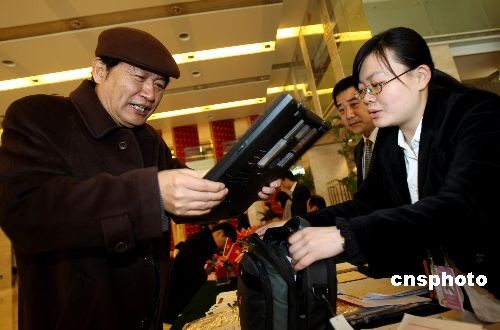When members of the Chinese People's Political Consultative Conference (CPPCC) registered for their current session on Sunday, they expected to be handed a hefty pile of documents.
Instead, to their surprise, each member received a laptop computer and a 2-gigabyte flash disk containing digital versions of the speeches, investigative reports, and other documents they will discuss. (They may be disappointed to learn they are expected to return the laptops when the conference is over).
 |
|
When members of the Chinese People's Political Consultative Conference (CPPCC) registered for their current session on Sunday, each??received a laptop computer and a 2-gigabyte flash disk containing digital versions of the speeches, investigative reports, and other documents they will discuss. According to the organizers, the CPPCC is trying to achieve an almost paperless meeting of the country's largest policy advisory institution. |
According to the organizers, the CPPCC is trying to achieve an almost paperless meeting of the country's largest policy advisory institution. With more than 2,200 members attending the 10-day session, this is an ambitious goal. Whether or not they succeed, I believe they are off to a good start.
At the very least, the CPPCC will achieve a significant reduction in paper consumption. As Han Shuli, a member from the Tibet autonomous region, recalled, at previous sessions each member received a pile of documents almost a meter high. These documents could weigh between 40 and 60 kg, equivalent to China's annual per capita paper consumption.
There has been a startling increase in China's use of paper over the past decade. According to Pulp and Paper International, the country consumed less than 40 million metric tons of paper in 2000. By 2007, that figure had reached 70 million metric tons.
China's annual per capita paper consumption is around 58 kg, far behind that of developed nations like the United States, which consumes more than 300 kg per person, but that is no excuse.
China produces only half of the pulp it needs, and rely heavily on imported pulp and waste paper. For every ton of paper that is used, 24 trees are felled and 7,000 gallons of water are wasted.
Water is becoming scarcer and scarcer, and more trees are felled than are planted each year. Everywhere in the world, from Scandinavia to Canada, native forests are shrinking. Even where trees are planted, experts say they cannot match the biodiversity of natural forests.
Climate change has wreaked havoc all over the world in recent years, causing hurricanes, drought, and forest fires. Greenhouse gas emissions are not solely to blame; the felling of trees is also a significant factor.
We cannot expect trees to continue to sustain our paper consumption. Government departments, institutions, and other offices must make saving paper a national priority.
Once, the advent of the computer was supposed to lead to the "paperless office". A quick look around any office (including mine) proves that that hasn't happened. Arguably, more paper is wasted by computers than ever came out of a typewriter, not to mention the reams that are used by copiers.
An obvious step would be for manufacturers of printers and copiers to make their products more compatible with recycled paper. Printers often seem to jam when we use recycled paper. Some of my young colleagues have even developed a phobia, believing printers require new paper. Also, it can be a daunting project to persuade a printer or copier to print on both sides of a piece of paper.
The CPPCC has set a good example. We should launch a national campaign to use paper efficiently, and to use as little of it as possible.
(China Daily March 5, 2009)